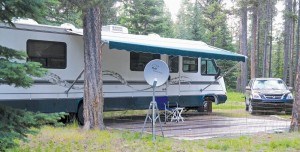
Jasper National Park is at the top of Parks Canada’s list for the installation of Internet hotspots.
On the docket for such services, according to Parks spokesperson Francois Duclos, is the townsite and the “the two nearest campgrounds”—Whistlers and Wapiti.
The installation of hotspots in Jasper is part of a larger project that will see 150 locations receive Internet access points over the next three years.
Following Parks’ announcement of the project last week, park users across the country spoke out, arguing that national parks are the last place they can go to unplug.
But according to Duclos, the project is actually a result of a high demand from Park visitors who want to stay connected.
“There’s now wifi in airports, even in airplanes, in buses, in cafes and hotels, everywhere,” he said. “Observing the industry around us, it’s a demand that’s been growing everywhere and it’s a need that everyone in the tourism business around us is either already fulfilling or looking at fulfilling.”
The demand for wifi in parks has been determined by calls coming into the national call centre, surveys done in the parks every five years and from watching what’s being offered elsewhere.
Talking about the survey, Duclos said wifi has been one of the top demands for the last few years.
“So our role is to make sure we offer the service to those who need it, without compromising the experience of those who don’t need it and even don’t want it,” he said.
That means keeping wifi out of the backcountry.
“We’re looking at strategic places, like visitor centres or other public spaces,” he said. “We don’t want to go into the backcountry with this service, we don’t want to go into the wilderness. That’s not where it belongs, and obviously that’s not where people want it either, we’ve heard that.”
Rather, wifi will appear in campgrounds that already have electricity, water, sewage and showers—the areas where RVs will be found, said Duclos.
As of now, the project is out for tender, as Parks searches for a supplier.
But Duclos said he thinks between 25 and 50 hotspots will be installed in 15 to 20 parks this summer.
“A park like Jasper would probably see a handful of hotspots, versus a smaller place like Elk Island that would probably receive a couple of hotspots,” he said.
Although it’s a large project that will take a few years to complete, Duclos said it won’t be expensive to implement or maintain—and there is no intention of charging extra fees to make that money back.
“Ten years ago it would have been a large expenditure, [but] nowadays setting up a hotspot can cost as little as a few hundred dollars and can cost as little as a hundred dollars a month to operate.
“So if we put things in perspective, selling just one family group annual pass per month will offset those costs.
“So we are going to include it in—what I like to call—our basket of services that you get when you buy the park pass.”
Nicole Veerman
[email protected]
